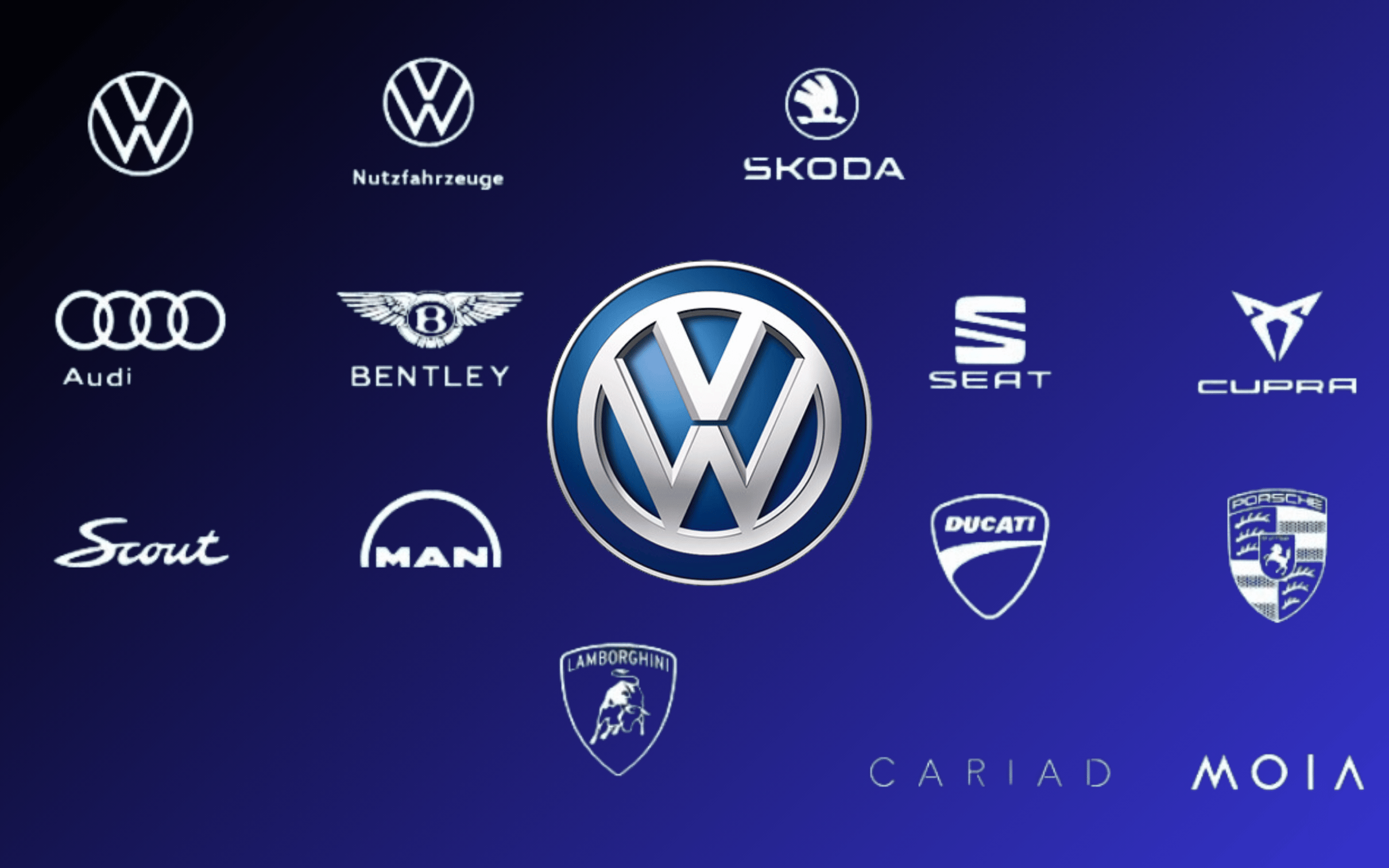The Volkswagen Group, full name Volkswagen AG, is one of the largest automobile manufacturing companies in the world. This headquarters-based German multichain corporation in Wolfsburg operates several automobile brands that have different identities and market positions. Be it regular cars, luxury cars, or even heavy trucks, Volkswagen Group spans almost every automobile market. The following article will consider the long list of Companies Owned By Volkswagen Group and then give an insight into the vast history that has formed this automotive giant.
History of Volkswagen Group

The story of the Volkswagen Group all began in the 1930s when the company itself, Volkswagen, was established. It had been founded to produce a low-cost “people’s car” in German for the common people. Following World War II, the legendary Beetle became an icon for West Germany’s economic rebirth and an instantly recognizable symbol around the world.
- In the 1960s and 1970s, Volkswagen made its forays into expansion through acquisitions and new models. In 1964, Volkswagen took over the Auto Union GmbH from which Audi was born, thus starting the process of Volkswagen becoming a multi-brand company.
- Further expansion in the 1980s and 1990s was made with the acquisition of SEAT in 1986 and Škoda in 1991. These strategic acquisitions were oriented towards getting into new markets and meeting consumer tastes that vary.
- At the turn of the millennium, the Volkswagen Group finally changed. In the year 1998, it entered the high–end car segment through inventions by Bentley, Bugatti, and Lamborghini. This ultimately placed Volkswagen within these classes, from budget to ultra-luxury, automotive brands.
- 2011 saw Volkswagen also reinforce its operations in the heavy-duty vehicle segment by acquiring a majority stake in MAN SE, and subsequently merging with Scania AB to form the Traton Group.
- Today, the Volkswagen luxury brands embarks on its transformation—by electric vehicles, in particular, and a broad range of sustainable mobility solutions. The “TOGETHER 2025+” strategy prioritizes the Company’s successful positioning as a world-leading supplier of sustainable mobility.
Volkswagen Highlights

| Elements | Description |
| Founder | Ferdinand Porsche |
| Headquarters | Germany |
| Industry | Automotive |
| Founded | 1937 |
| Products | SUVs, Trucks, Cars, Motorcycles |
| Brands | SEAT, Porsche, Audi, Volkswagen, Ducati, Lamborghini |
| History | Volkswagen Group all began in the 1930s when the company itself, Volkswagen, was established. It had been founded to produce a low-cost “people’s car” in German for the common people. |
| Financial Performance | Cash flow for 2024 is expected to be between EUR 4.5 and EUR 6.5 billion. |
List of Companies Owned By Volkswagen Group
The Volkswagen Group is one of the largest automobile manufacturing companies in the world. The group has under its umbrella an array of brands targeting all kinds of market segments.
Starting from everyday cars to sporty luxurious cars and commercial trucks, the diverse portfolio of this group highlights its leading position in the worldwide automobile industry. Now, let’s take a look at the major brands making up this automobile giant.
1. Audi

Audi is the company’s premium brand; it has created a niche for itself in leading luxury car companies. Known by its advertising slogan “Vorsprung durch Technik,” which roughly translates to “Progress through Technology,” the brand Audi merges the most progressive and new-fangled innovations with elegant design.
It offers a rather full range, from the compact A1 to the limousines of the A8 and the entire series of growing SUVs in the Q-series. Its commitment to performance is seen in the S and RS models that offer high-performance categories for standard versions.
First of all, it has pioneered lighting technology innovation through its LED and Matrix LED systems. In the past couple of years, Audi has also been very aggressive about electrification through its e-tron line by introducing completely electric models to the market in different segments. In addition, autonomous driving technology is perceived as one of the areas in which the company has invested heavily; it is strongly aimed at becoming an innovator in this luxury automotive group.
2. SEAT

SEAT means Sociedad Española de Automóviles de Turismo, which means Spanish Company for Touring Automobiles. Founded in 1950, it is a Spanish company manufacturing automobiles and has been a subsidiary of the Volkswagen Group since 1986.
The company is more sports and design-oriented and hence targets young customers, who mostly come from European countries. Popular cars in its model portfolio include dynamic and sharp designs in the Ibiza hatchback, Leon compact car, and Ateca SUV.
In previous years, SEAT has already further developed its SUV range to clamber at better positions, given the high growth levels that these types of cars are recording. The brand has been investing more in electrification, with hybrid and electric versions of its key models just coming through to get more relevant in a segment ruled by rapidly changing customer tastes and stricter emissions rules.
SEAT represents the Group’s entry into the Southern European markets that produce affordable youthful, chic, and high-tech vehicles that help attract young buyers.
4. Škoda

Škoda is a Czech automobile manufacturer acquired by the Volkswagen Group in 1991. It provides practicality and value for money without compromising on its growing presence across growing markets.
Škoda’s “Simply Clever” philosophy emphasizes practical features that people will use day in, and day out, such as a recessed umbrella in the doors or an ice scraper behind the fuel filler cap. Its lineup runs from the baby Fabia through to the expansive Superb sedan and the seven-seat Kodiaq SUV.
Under Volkswagen’s ownership, Škoda has grown from a regional marque to a global player; the alliance has added much-needed quality and technology without losing its competitive pricing.
More recently, Škoda has been expanding its SUV range while looking to increase volumes of pure-electric and hybrid vehicles in line with broader Volkswagen Group electrification ambitions. It is also the brand’s inbuilt amalgamation of practicality, space, and value that makes it extremely popular in Central and Eastern Europe, India, and China.
4. Bentley

Bentley is British luxury at its best and has been the property of Volkswagen since 1998. The brand does have prestige imagery about it, through its meticulously handcrafted interiors, potent engines, and incredible attention to detail.
Under its roster, it has models of iconic status like the Continental GT grand tourer, Flying Spur luxury sedan, and the Bentayga SUV. Each Bentley is highly specialized in its construction, but it puts traditional skills—such as hand-stitched leather-lined interiors—alongside the most up-to-date technology.
It has managed to update its brand image without losing its heritage and is, therefore, equally attractive to traditional buyers of luxury cars and the new generation of wealthy buyers. Of late, Bentley has been quite focused on the sustainability front and made commitments to hybridizing all of its models by the year 2023, with full electrification in the long-term goals.
This realignment is aligned with the umbrella strategy at the Volkswagen Group but keeps Bentley at the forefront of sustainable luxury.
5. Bugatti

Bugatti is a French manufacturer of hypercars. This brand entered the Volkswagen Group back in 1998. The brand stands for the extremes in performance, exclusiveness, and automotive art. Bugatti creates the fastest and costliest cars in the world.
Veyron and Chiron come with the leading performances that push the boundaries on what is possible to get from automotive engineering. Every Bugatti is a testament to the fact that artisanal workmanship can combine itself well with state-of-the-art technology.
Quite often, the brand’s cars represent technological flagships across the Volkswagen Group related to innovations in aerodynamics, materials science, and powertrain technology. Bugatti’s rather limited numbers of production ensure exclusivity, and quite often each car is tailored to its owner’s specifications.
Primarily focused on hypercars, Bugatti has once explored other segments, such as the Galibier concept, which became a luxury sedan. It is a crown jewel in the portfolio of the Volkswagen Group because of its commitment to excellence and innovation.
6. Lamborghini

Lamborghini is an Italian manufacturer of supercars that joined the Volkswagen Group under Audi in 1998. This brand has been characterized by beauty of form, emotional appeal, and high performance. Iconic V10 and V12 engines power mind-blowing models like Huracán and Aventador.
These are crazily styled, scissor-door, and outrageously performance-laden supercars. More recently, it has diversified into the luxury SUV market, broadly represented by the Urus, which is already its best-volume seller.
Not an insubstantial move, it greatly helped raise the sales volume and profitability of this marque. On being acquired by Volkswagen, Lamborghini experienced colossal growth and technical sea change while capitalizing on the group resources with a characteristically Italian flair.
It has also stepped up its hybrid technology, looking ahead to a time when even supercars will have to meet stricter emission standards.
7. Scania

This Swedish commercial vehicle manufacturer joined the Volkswagen Group in 2008. Heavy trucks, buses, and also diesel engines for industrial and marine applications are the main fields of operation of Scania. The Swedish Company Scania is famous for producing heavy-duty vehicles that are fuel-efficient and reliable.
Much attention is paid to the total operating economy of customers. The company offers a huge variety of solutions, starting from transportation over long distances and finishing with construction and urban applications.
Scania has been at the forefront of sustainable transport solution development in the past years—vehicles powered with alternative fuels and electric drivetrains. The commercial vehicle expertise of the company offsets the passenger car orientation of Volkswagen, thereby giving the group a good presence from across the entire sector of transportation.
Its integration into the Volkswagen Group has indeed enabled Scania to realize knowledge exchange and synergies with MAN Truck & Bus.
8. Porsche

Although it had a complex ownership history with Volkswagen, Porsche became a fully integrated group brand in 2012. This is the brand consumers associate with high-performance sports and luxury cars that boast superior engineering and design distinction.
The iconic model of Porsche is the 911—a sports car that has been continuously developed over the years yet still managed to retain its essence. The Cayenne and Macan SUVs were bestsellers and established the brand’s successful expansion into new segments.
Porsche has continued to be a leader in hybrid sports car technologies, the pioneer having been set with models like the 918 Spyder, which merely gave hints of what electrified performance cars can do. Recently, all-electric performance made its debut under this brand due to the Taycan—the proof needed that sustainable mobility need not come at the cost of driving enjoyment.
The high-performance, luxury, and innovative mix of the Porsche brand makes it one of the most profitable companies belonging to the Volkswagen Group.
9. Cupra

Cupra was initially a performance subsidiary of SEAT before becoming an independent brand in 2018. It is something ephemeral in development on its own but was characterized mainly by sportiness. It targeted that extra touch of prestige and people who love speed and were looking for something a bit more elite than mass-market vehicles.
It does produce high-performance derivatives of SEAT models, as in the case of the Cupra Leon, but is developing uniquely styled car models, such as the Formentor: a performance crossover SUV. But perhaps most of all, it makes a very strong case for electrification—the hybrid and all-electric derivatives of principal models taking a central place in the product portfolio.
Cupra designs are marked by hard-hitting styling cues and copper-colored touches that provide an across-the-board visual identity for the marque. Cupra is the newest company under the Volkswagen Group. What it does is give the conglomerate the ability to service niche markets while others do more volume work.
It is centrally focused on electrified performance—again a space that fits in with the group’s broader strategy while tugging at the heartstrings of a young and adventurous demographic.
10. Volkswagen Commercial Vehicles

Another independent brand within the group is the presence of Volkswagen Commercial Vehicles. It is an independent brand that specializes in light commercial vehicles, vans, and campers within the group.
That is the division includes such popular models in its lineup as Transporter, Caddy, and Crafter, which assist business activities from small urban deliveries to large consignments. Besides, the brand offers individual solutions for different industries—frigorific vehicles, mobile workshops, and rescue services.
Over the past few years, Volkswagen Commercial Vehicles has been developing electric derivatives of popular models in demand by zero-emission urban delivery vehicles. The division has also exploited the lifestyle market with models like the California camper van, targeting clients who enjoy the outdoor and adventure scene.
This portfolio will diversify and enable Volkswagen to target business customers and private end-customers seeking versatile, practical vehicles.
11. MAN Truck & Bus

MAN Truck & Bus is a German commercial vehicle manufacturer and has been a part of companies owned by Volkswagen Group since 2011. This company manufactures trucks, buses, vans, and diesel-powered engines applied in many respects.
MAN develops innovative, efficient commercial vehicles and enjoys excellent geographical positioning in European and global markets. It is a solution provider for all areas of transport—from long-distance freight transport to urban supply and passenger transport.
MAN has been intensively involved in recent years in the development of electrical and alternative drive technologies, so the future of transport is secured. TGX long-haul trucks received numerous awards for their efficiency and driver comfort features.
MAN’s integration into the Volkswagen Group consolidated the leading position of the holding company in the segment of commercial vehicles, ensured synergies with other brands, like Scania, and has opened the avenue to develop next-generation technologies for transport.
Suggested Read: Top 10 IT Companies in World
Conclusion
The diverse Companies Owned By Volkswagen Group allow it to compete in almost every available automobile market segment, which spans from budget cars to ultra-luxury automobiles and commercial trucks.
This has been the winning strategy that catapulted this group to the top of the automotive industry—agile to any market demand and technological change. Against the backdrop of growing red-hot electrification and self-driving dynamics in the industry, the scattered competence of Volkswagen Group’s brands would help carve out a path for the future shape of mobility.
Suggested Read: 10 Best Car Companies in India
FAQs
How many brands does the Volkswagen Group consist of in all?
The Volkswagen Group has 11 prominent automobile brands under its holding, which include Volkswagen, Audi, Porsche, and Lamborghini.
Does Volkswagen Group own any truck makers?
Yes, it does; the group owns commercial vehicle makers like Scania and MAN Truck & Bus.
What is the newest brand in the Volkswagen Group?
Well, Cupra is a fairly young brand—born as an independent brand in 2018—and is the newest member of the Volkswagen Group of companies.
Does the Volkswagen Group have any motorbike brands?
Yes, it does; Ducati, the motorcycle-building company from Italy, belongs to the group through the subsidiary Audi.



